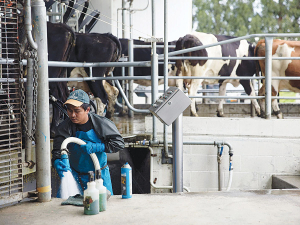Editorial: RMA reforms uproar
OPINION: The euphoria over the Government’s two new bills to replace the broken Resource Management Act is over.
 Federated Farmers has been pushing for changes to the Accredited Employer Work Visa scheme on behalf of farmers desperate for migrant workers to ease acute staff shortages on farm.
Federated Farmers has been pushing for changes to the Accredited Employer Work Visa scheme on behalf of farmers desperate for migrant workers to ease acute staff shortages on farm.
OPINION: Dairy farmers will be breathing easier thanks to the Government last month delivering a Christmas gift in the form of immigration reforms.
For years, Federated Farmers has been pushing for changes to the Accredited Employer Work Visa scheme on behalf of farmers desperate for migrant workers to ease acute staff shortages on farm. Getting visa approval for an accredited employer to recruit a migrant dairy farm worker is taking up to six months.
For dairy farmers, the crux of the problem has been the type and format of information required by Immigration NZ and the time officials are taking to process applications.
Feds have been pushing for a simpler process and greater recognition for accredited employers.
And it was Immigration Minister Erica Stanford who really delivered for farmers last Christmas.
The critical changes to the Accredited Employer Work Visa settings include:
This hardly made sense, paying what are essentially entry-level farming staff the median wage, particularly when that's more than what a Kiwi in the same role would be earning. All that did was inflate the wage bill for farmers who were already under huge pressure, desperate to find staff, and couldn't find any suitable Kiwis who wanted to do the work.
This means a staff member can stay in the country for three years on one single visa, instead of needing two visas by the time you apply for the one-year extension. For farmer employers wthis will cut thousands of dollars in costs for farmers.
DairyNZ data shows that 16% of farms didn't have enough staff to meet their needs.
The Government's changes will make it easier for the dairy sector to attract good overseas workers and ease the staff shortage while helping to create a pathway for these migrants. It's a win-win situation.
Global trade has been thrown into another bout of uncertainty following the overnight ruling by US Supreme Court, striking down President Donald Trump's decision to impose additional tariffs on trading partners.
Controls on the movement of fruit and vegetables in the Auckland suburb of Mt Roskill have been lifted.
Fonterra farmer shareholders and unit holders are in line for another payment in April.
Farmers are being encouraged to take a closer look at the refrigerants running inside their on-farm systems, as international and domestic pressure continues to build on high global warming potential (GWP) 400-series refrigerants.
As expected, Fonterra has lifted its 2025-26 forecast farmgate milk price mid-point to $9.50/kgMS.
Bovonic says a return on investment study has found its automated mastitis detection technology, QuadSense, is delivering financial, labour, and animal-health benefits on New Zealand dairy farms worth an estimated $29,547 per season.

OPINION: Here w go: the election date is set for November 7 and the politicians are out of the gate…
OPINION: ECan data was released a few days ago showing Canterbury farmers have made “giant strides on environmental performance”.